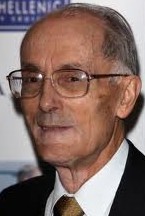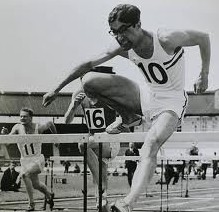Peter Hildreth, the former Olympic hurdler who went on to be athletics correspondent for the Sunday Telegraph for more than 30 years, died peacefully in his sleep at his home in Farnham on Friday. He was 82.

Hildreth lived a full and successful life in various areas: a Cambridge history graduate, three-time member of Britain’s Olympic teams as a high hurdler who won the bronze medal at the 1950 European championships, he worked in hospital administration and later estate agency, as well as writing on his sport for the Sunday Telegraph from its launch in 1961 until 1994.
Hildreth was a dogged anti-doping campaigner, something which was not without its set-backs, who also had the touch of an English eccentric.
When, two years ago, Hildreth appeared in the Daily Mail after being “banned” from a Guildford department store for running up the down escalator – seeking to repeat a training feat of his youth as he approached his 80th birthday – his friends and colleagues allowed themselves a quiet chuckle and muttered “that is so Peter”.
Peter Hildreth was also one of the last links back to the Chariots of Fire era of British athletics, his father having competed at the 1924 Paris Olympics alongside Harold Abrahams and Eric Liddell.
Hildreth was born in Bedford on July 8, 1928. As his father worked in India, young Peter spent his formative years there. His father, Wilfred “Will” Hildreth, was a good enough sprinter to hold the All-India 200 metres record for more than 20 years (22.2sec, set in 1923).
Young Peter was sent back to England to complete his education at Ratcliffe College in Leicestershire, where he began his hurdling career before going up to Downing College, Cambridge, and National Service in the RAF in the immediate post-war years.
His international athletics breakthrough came in Brussels’ Heysel Stadium 61 years ago, where on a sodden cinder track, he doggedly battled through the puddles for a bronze medal.
“It was a smaller affair than these days, where it is now a global industry,” Hildreth recalled in an interview with Alistair Aitken four years ago. “It was amateur and so soon after the war. There was austerity and food rationing.
“In the final I drew the wet Lane 1 nearest the inside of the track. The two people who beat me were in lanes covered by the roof. They beat me by a long way and I don’t think that would have made a difference. Afterwards I went to the drinks counter and got a free Ovaltine and so I drank a cup and looked at that medal. After that, I could not let it go.”
Appearances at the 1952, 1956 and 1960 Olympics all followed, and though he was a 110 metres hurdles semi-finallist in Melbourne and placed fourth at the 1958 Europeans, Hildreth never surpassed that 1950 bronze medal.
Hildreth does have a Trivial Pursuit claim to fame: he won the race (a 220yds hurdles) at Iffley Road, Oxford, in May 1954 immediately before Roger Bannister became the first man to run the Mile in less than four minutes.
During his lengthy career, Hildreth five times ran 14.3sec to equal the British 110m hurdles record that had been set by his hero, Donald Finlay.

“To me he was the greatest British high hurdler. Colin Jackson is only the fastest,” Hildreth would say, pointing to 1938 European champion Findlay’s six years’ war service, as a Battle of Britain pilot, and return to competition at the age of 40, racing close to his fastest times.
Hildreth’s own athletics career, too, lasted well in to his 30s. His competitive retirement saw him taking up reporting for the Sunday Telegraph, as well as sometime radio commentary for the BBC.
His former sports editor, Trevor Bond, paid tribute to Hildreth today, saying, “As a hurdler, he’d have been pleased to have run a marathon in life.”
Recounting an incident from the 1980 Moscow Olympics, Bond suggests Hildreth was a doggedly determined in his sports reporting as he had been as an athlete.
“Peter was taken ill with a virus the night before Seb Coe and Steve Ovett were due to run the second part of the ‘double’, the 1,500 metres. It was the story of the Games after Ovett had won the 800. I got a call on the morning from Chris Moore (our back-up man) to tell me about Peter. Then I had a call from Ken Mays, the athletics correspondent of the Daily Telegraph effectively to tell me that he was going to do the race for the Sunday paper. I declined politely.
“The next call I got that day was from Peter from his hospital bed informing me that nothing in the whole world was going to stop him reporting the event. ‘I haven’t come all this way to let a stupid bug stop me reporting another ding-dong between Coe and Ovett’.
“The last call was from Peter at the stadium, in his seat, ready to go. Needless to say, the report was superb and in that one incident, Peter showed that he was no ‘amateur’ playing at journalism, something others accused him of, but a good professional.”
Hildreth would continue to cover athletics for the Sunday Telegraph until 1994, becoming something of a Quixotic figure in his conviction – based on his own experiences – that no modern era athlete was able to perform at the levels achieved without using banned performance-enhancing drugs. Some of the biggest names of British athletics remained steadfastly in Hildreth’s sights.
The lawyers made sure that little of Hildreth’s extensive research and meticulously kept files made it in to print, prompting him at one stage after retiring from the Telegraph to try to use his material as the basis for a work of fiction.
Pat Butcher, a former chairman of the British Athletics Writers’ Association who shared many hours in the press boxes of the 1980s with Hildreth, wrote today: “Hildreth was the first (and most persistent) person in the British media to proclaim the extent of drug-taking in athletics… It has long since become obvious that he was well ahead of the game, for he was closer to the truth than any of us.”
Hildreth always kept himself very fit, long into retirement never weighing more than 10st despite his 6ft height – his “fighting weight” from his racing days. The “escalator incident” was symptomatic of that, the exasperated manager of the department store declaring, “We have customers in their 70s who go down the escalator the right way and fall over. We really don’t want him to hurt himself.”
But this belated fame saw Hildreth win a special award from Richard Ingrams’ The Oldie magazine, to his obvious delight.
Peter Hildreth is survived by two children, from his first marriage, and five grandchildren, and his second wife, Carole. The SJA sends its condolences to the family.